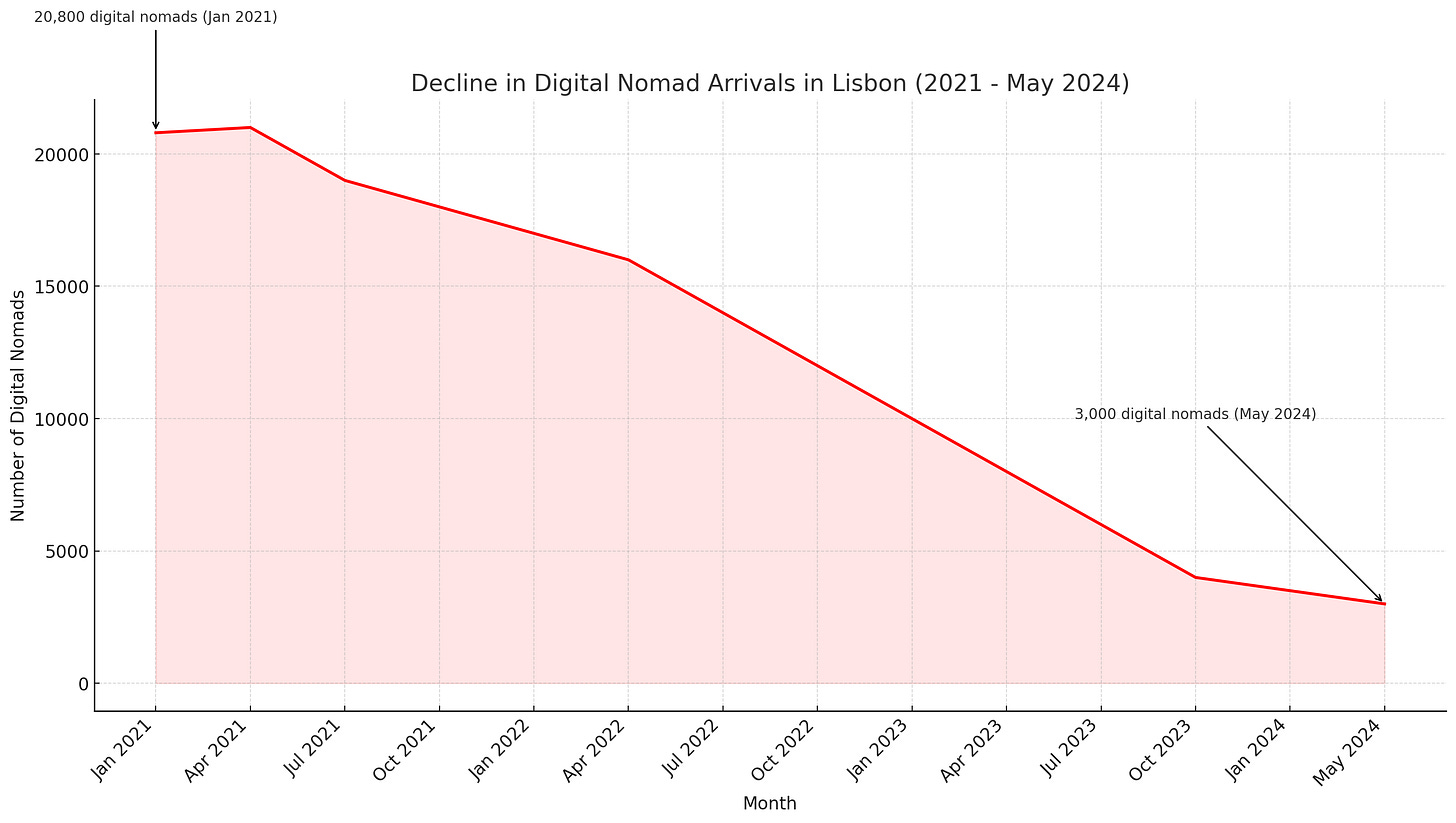Portugal's Digital Nomad Dream Fades: Rising Costs and Policy Shifts Push Remote Workers Away
Lisbon's popularity as a digital nomad hub wanes as rising housing costs, policy changes, and anti-nomad sentiment drive remote workers to seek new destinations.
Portugal, once a top destination for digital nomads, is experiencing a significant decline in remote worker arrivals, with data showing a dramatic drop in Lisbon's popularity.
The number of digital nomad visa applications plummeted from 300 per month to just 18 in May 2023, and Airbnb prices have skyrocketed, making it increasingly difficult for nomads to find affordable housing. The end of the non-habitual residency (NHR) tax regime, which attracted many high-earning professionals, has further contributed to the exodus.

A Shift in Destination:
The decline in digital nomad arrivals in Lisbon is evident in data from NomadList1, a platform that tracks remote worker travel trends. In October 2021, Lisbon saw an estimated 20,800 new arrivals per month, but that number fell to just 3,000 in May 2023, representing an 86% decline.
The Portuguese government's decision to end the Golden Visa program, which granted residency to foreigners who invested in real estate, further contributed to the perception that Portugal is no longer welcoming to expats and remote workers.
The NHR's Demise:
The NHR tax regime, which allowed individuals to pay a flat 20% income tax rate on most income earned in Portugal, was a major draw for digital nomads. However, the regime ended in January 2024, leading to concerns that Portugal is no longer a competitive destination for high-earning professionals.
"Portugal was attracting some of the brightest minds in the world with the NHR. Ending this talent attraction tool was the biggest mistake our previous government did," Gonçalo Hall, CEO of NomadX, a company that created the world's first digital nomad village in Madeira, wrote on LinkedIn.
Beyond Lisbon:
While Lisbon's popularity has waned, other regions in Portugal are seeing increasing interest from digital nomads. Porto, with its charming atmosphere and lower cost of living, is a rising star.
"It's beautiful, relaxed, and has a nice vibe," says Hayley Knight, a digital nomad who has visited Lisbon and Porto.
However, the overall decline in nomad arrivals is a significant concern for the Portuguese economy. The government is facing pressure to develop a comprehensive strategy to attract and retain remote workers, particularly outside of Lisbon.

The Future of Portugal:
The future of Portugal as a digital nomad destination hinges on the government's ability to address the concerns of remote workers and create a more attractive environment. This includes developing affordable housing options, creating dedicated nomad communities outside of Lisbon, and investing in infrastructure to support the remote work lifestyle.
"Portugal needs to apply a country-wide strategy to decentralize, coordinating with Peniche, Albufeira, Portimão, Azores, Madeira, Porto, and all the places with potential to make a coordinated strategy," says an unnamed source.
The government must also consider reinstating the NHR or implementing similar tax incentives to attract high-earning professionals.
A Global Opportunity:
As Portugal struggles to retain its digital nomad appeal, other European countries are stepping up their efforts to attract remote workers. Spain, Italy, Greece, Croatia, and Albania are all actively promoting themselves as digital nomad hubs, offering competitive tax regimes, affordable housing, and welcoming communities.
The digital nomad movement is evolving, and destinations that can adapt to the changing needs of remote workers will be the most successful.
Key Takeaways:
Portugal is experiencing a decline in digital nomad arrivals due to rising housing costs, policy changes, and anti-nomad sentiment.
The end of the NHR tax regime and the Golden Visa program have contributed to the exodus.
Lisbon's popularity has waned, but other regions in Portugal, such as Porto, are seeing growing interest.
The government needs to develop a comprehensive strategy to attract and retain remote workers, including developing affordable housing options, creating dedicated nomad communities, and investing in infrastructure.
Other European countries are actively promoting themselves as digital nomad hubs, offering competitive tax regimes, affordable housing, and welcoming communities.
Source:
Nomadlist.com. (n.d.). Lisbon travel trends.
Partington, M. (2024, June 28). Is the digital nomad dream over in Lisbon?. Sifted.
Hall, G. (2024, June). Hundreds of digital nomads and expats are leaving Portugal, here's why and how it's not too late to reverse the brain drain. LinkedIn.
Decline in Digital Nomad Arrivals in Lisbon (2021 - May 2024): Values shown are estimated visits by traveling remote workers based on the total amount of trips logged by Nomad List members. Visits to a place are only counted once per year per user, even if they visit more in that year. Not all nomads are on Nomad List, and not all Nomad List members log their trips. So the data is only indicative. Nomadlist.com



